This post has been sitting in my drafts for a while, and I was reminded to complete it after a question from a student when I was covering a TOK class: “What’s the difference between inquiry and enquiry?”
[tL:dR: Definitions matter in education, especially when a topic is misunderstood or controversial. Using traditional definitions allows for a distinction between purposeful inquiries and surface enquiries. This can help choose the right tools for the best learning and most appropriate time. We can have the best of both.]
……….o0O0o………..
Defining Inquiry: A Pragmatic Approach
I’ve been thinking and writing about this a lot over the last few years, tinkering with and testing definitions that try to capture what makes powerful, pragmatic inquiry learning. He’s my current best effort and if you pick it apart you should be able to recognise the best elements of the classical with an aspiration towards the contemporary (in the Bold Moves sense).
Inquiry is… creative, critical, reflective thought. It builds on a solid foundation of accessible, well-learned knowledge, skills and conceptual understandings, inviting learners to take action on their learning and ask “what if…?”
Although it opens with higher-order aspirations, and closes with an invitation to action, it is anchored by a solid foundation of knowledge, skills and concepts. Knowledge is the stuff we think with: the more we know, the better our questions and stronger our conceptual understandings. This does not dictate a linear approach. It highlights the critical role of the expert teacher who, with subject mastery and pedagogical mastery, can create a true culture of thinking in their class, (co-)creating the moving forces of experience that pull a community of learners through the hard work of building understanding.
An expert inquiry teacher inspires learners to learn lots, learn well and want to learn more. They know what needs to be taught, what has been learned and how to use this as a launching pad for exciting exploration.
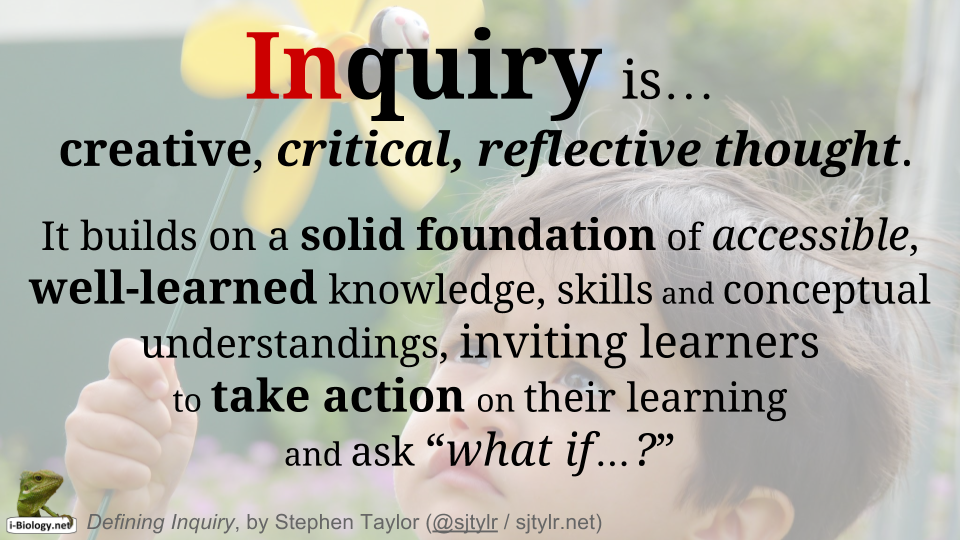
……….o0O0o………
So what about inquiry vs enquiry?
Beyond some regional variation*, I find this OUP contrast really useful in developing curriculum, collaborating with teachers and working with students. I suspect that the two terms are conflated in the minds of many (educators and non-educators). Could a clear distinction help?
“The traditional distinction between the verbs enquire and inquire is that enquire is to be used for general senses of ‘ask’, while inquire is reserved for uses meaning ‘make a formal investigation’.” [Oxford Living Dictionaries]*
It helps evaluate the depth of an inquiry in terms of moving into investigation, creation and research, rather than the simple act of “looking stuff up”. Enquiry gives inquiry a poor reputation when inordinate amounts of time are spent on (perceived) “fluff”, squeezing out the opportunities for truly engaging experiences. There is a time and place for enquiry, and I’ve labelled it as “enabling” in the image below.
Quick questions and known answers that have little need to expend mental energy (or valuable time): there are more efficient ways to learn about or find out simple content. The expert inquiry teacher knows which tools to select for the job.
So here’s a little planning mantra I like to hold in my head:
“Is this an inquiry with an ‘I’ or an enquiry with an ‘e’?”
How could you use/adapt some of these questions/provocations to classify your inquiries? (I’ll add/edit over time, I’m still tinkering with these ideas):
- Does it require significant new learning to me, or is is re-presenting known content? Am I really learning?
- Am I truly engaging with the content, skills and concepts or am I transcribing items from one place to another? Am I really learning?
- Am I building tenacious new understanding or storing temporary thoughts? Am I really learning?
- If I learn this this way, will I learn this best for its purpose? Am I really learning?
- Am I “just Googling” or am I sorting, evaluating, synthesising? Am I really learning?
- Is this the equivalent of a deep investigation (or creation), or a “helpdesk enquiry”?
- Will I be spending my time on thinking, investigating or creating, or will I be clicking, copying or pseudo-creating? Am I really learning?
- If I’m working with a group, are we in dialogue, discussion and collaboration or chatting, partitioning and time-wasting? Am I really learning?
- If I’m using technology is it amplifying or transforming the learning, or replacing a simpler (possibly more efficient) process? (RAT model) Am I really learning?
- Am I learning authentically in the discipline (e.g. “as a scientist”) or about the topic (e.g “about science”)? [Thinking from the perspective of supervising extended essays, developing inquiries, etc)]
- Could my learning give rise to newer, stronger questions, or will it end there?
- What am I doing in this inquiry that is more sophisticated than a student younger than me? For example, if I’m an MYP student, how am I asking a question that is more sophisticated than in PYP?
- Is this experience a moving force that will create a drive to know, leading me into learning more, or is it a gimmick that gives the illusion of learning? Am I really learning?

……….o0O0o……….
Shifting the Questions
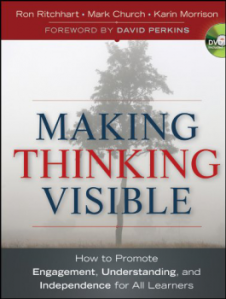
Some strategies for taking a question from enquiry to inquiry:
- Question Starts (Making Thinking Visible) is a very simple set of question stems that can force a student to think about a topic from different perspectives. Importantly, students need to classify and evaluate the questions.
- Think, Puzzle, Explore (Making Thinking Visible)… but insist on quality. Similarly with See, Think, Wonder, run the routine until the observations and ideas are exhausted. This can take questions beyond the surface.
- Creative Questions (Making Thinking Visible). A simple routine for interrogating proposed questions for quality and depth.
- Similarly, Options Explosion can be used: students list all obvious options, questions or ideas and then find the hidden options or new questions that arise.
- Predict, Observe, Explain (NSTA). Great for working with data of any kind, or thinking about cause/effect and correlation. This can generate many points of questioning, and can be extended into Predict, Observe, Explain, Investigate.
- “How else can this be used?” Visual organizer for accessing Webb’s DOK4 from different domains.
Enquire, Inquire, Perspire, Inspire: a distillation of many ideas:
Generate ideas, get the easy stuff out of the way and used it to create better inquiries. If something needs to be learned, learn (teach) it well and check it is understood. Use it to inform stronger lines of inquiry. Put in the hard work of inquiry authentic to the disciplinary/interdisciplinary investigation. Evaluate the learning, communicate and put it to meaningful action.
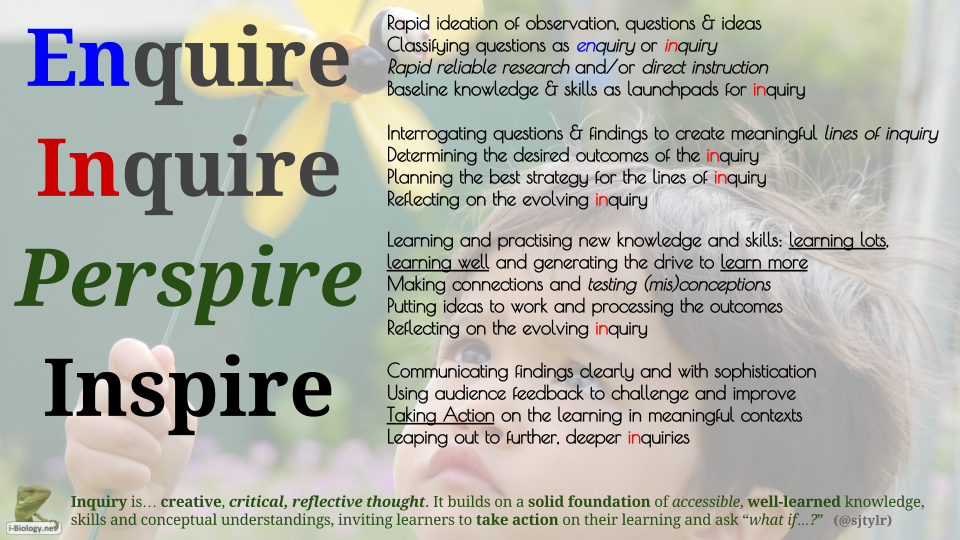
………o0O0o……….
Post-script: The Journey of a Thought
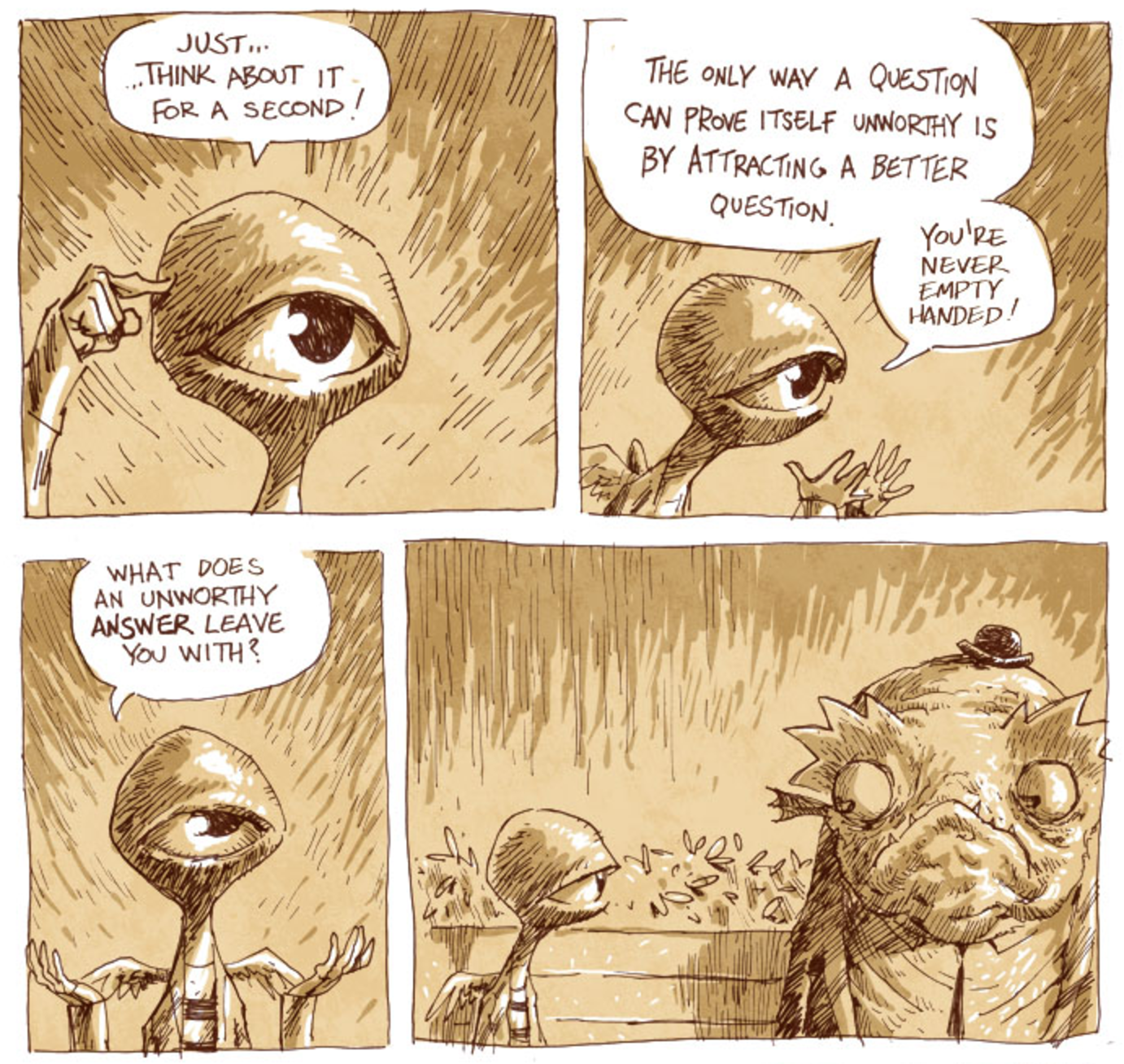
In the ‘enquiry’ sense, one could just look up a definition and be done with it, but I’ve been wrestling with ideas around purposeful, pragmatic inquiry for a long time (since ULL at Bath), connecting it to recent posts about DOK4 and Transfer, the ‘buoyant force’ of continuum learning and the “quest for learning”. More fundamentally it builds from the pragmatic definition of inquiry (IS Magazine) and investigating effective teaching and learning practices that allow for students to become knowledgeable, reflective, open-minded thinkers and clear communicators.
There is no need for an ‘either-or’ approach to inquiry learning (in the progressive vs traditional sense); a strong inquiry experience develops the modern trivium of grammar (knowledge), dialectic (questioning) and rhetoric (communication).
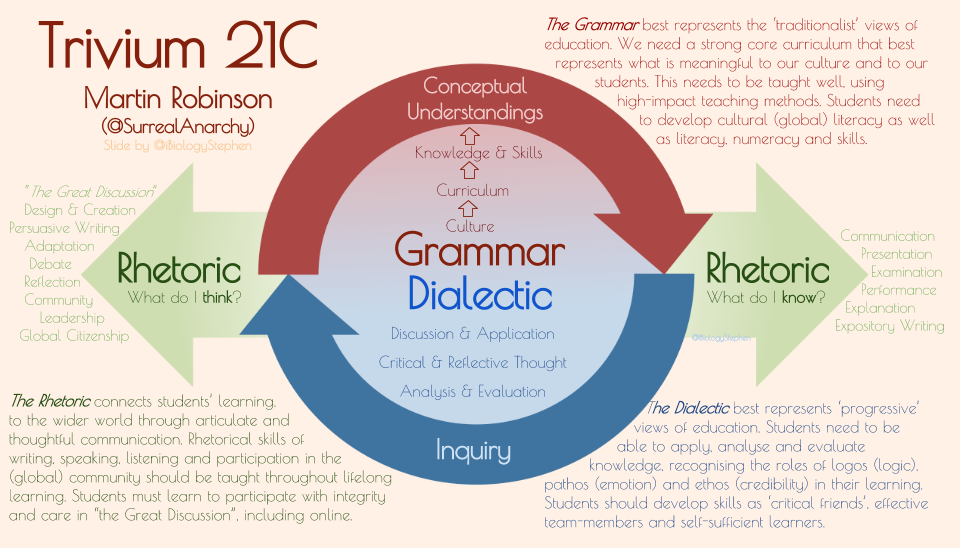
……….o0O0o………
If you’ve been thinking about this too, let me know in the comments below or find me on Twitter.
………o0O0o……….
Edits/Clarifications
*The British vs American usage in the general sense might hold to enquiry vs inquiry (thanks Des O’Sullivan on Twitter), though here I’m trying to distinguish ‘weak’ vs ‘strong’ question-driven learning. Where enquiry might be more common in general use in the UK (Oxford), the ‘i’ form is still used for ‘a formal investigation’ and this is closer to the heart of what we’re trying to achieve in deep learning, authentic to our disciplines. British media will still tend towards ‘inquiry’ for investigation (examples at the Guardian), with ‘enquiry’ for simpler questions (examples at the Guardian). An “inquiry into…” vs “helpdesk enquiries“, if you will. To me, ‘enquiry learning’ is looser, less purposeful and (possibly) ineffective. ‘Inquiry’ in this sense is focused, purposeful and powerful, as intended the IB context (all IB docs use the ‘i’).
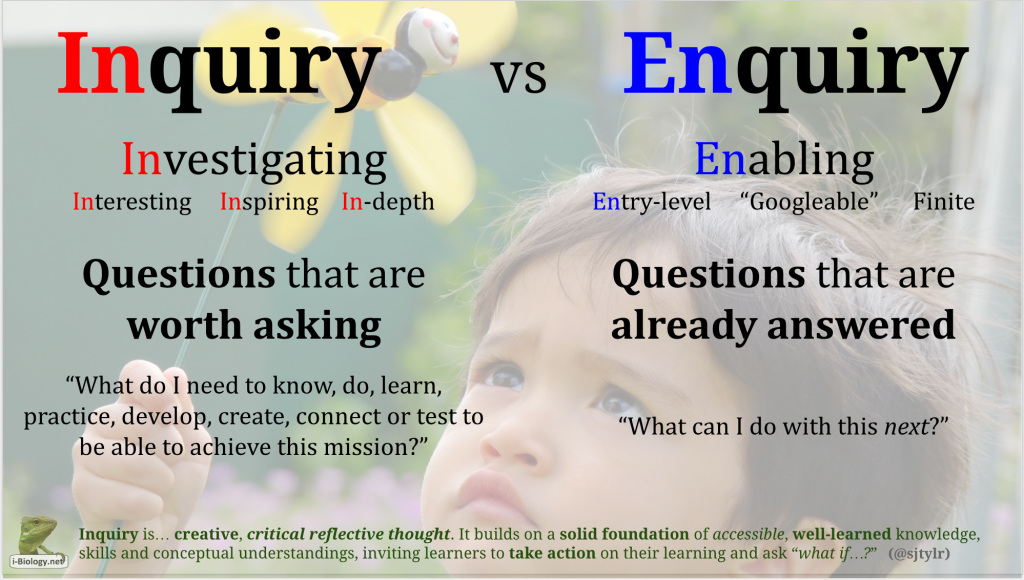
Thank-you for your comments.